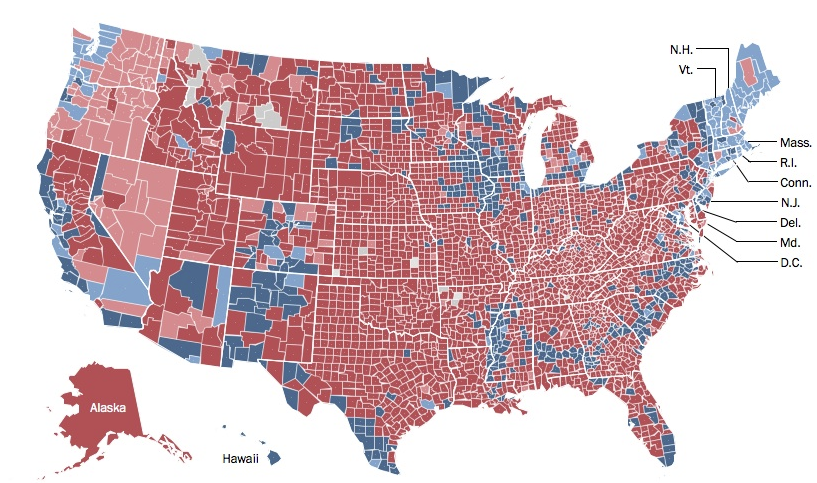Red counties, Blue cities. The political map of the United States shows a decided liberal bias in the major population centers of the nation, and a clear conservative bias in rural America. Blue cities create Blue states in federal elections and for governorships because statewide voting is based on the popular vote. Yet the legislatures of many Blue states remain conservative because their counties are almost all Red strongholds.

The popular vote clearly favors major population centers and is leading to the disenfranchisement of rural Americans on statewide and federal issues. Cities alone should not be driving statewide policy and the selection of the U.S. president. For example, from a purely material perspective, cities require additional infrastructure for transportation, police and fire services, general code enforcement, criminal and civil justice and waste management. Increased infrastructure means increased state (and sometimes federal) taxation, and larger or additional social programs that may not be needed nor favored in rural areas. And although the poverty level is about equal in urban and rural areas, cities have a higher population of impoverished individuals to support economically, which also leads to higher taxation and a proliferation of social programs. People living in rural America also tend to be older than those in the cities and suburbs, which leads to different needs, including medical, which are often underserved because the focus is on city residents. From a religious and moral perspective, city residents and rural inhabitants vary significantly on the practice of religion and have varying viewpoints on key contested moral issues including abortion, the acceptance of homosexual practices and immigration.
There is nothing sacrosanct about conducting elections according to a popular vote. The framers of our constitution recognized that the popular vote was inherently unfair to smaller states, and an electoral college was created to elect the president. With the rapid growth of cities since the advancement of the industrial age in America, circa 1865, a new approach is needed to preserve the rights and the voices of those that live in rural America. An electoral college within a state is the only proposal that will preserve the rights of rural Americans, just like the federal electoral college is the only system that preserves the rights of smaller states in selecting a president for the United States.
The structure for a State Electoral College is simple. Each county and city in the state is assigned a number of electoral votes based on its population. Cities will obviously have more than counties. But the total number of electoral votes needed for certain decisions will be greater than the electoral votes of all the cities in the state combined. Accordingly, at least some counties must vote for the measure or the candidate in order for passage. The result is representation for rural counties in state-wide elections.
A State Electoral College should be required in each state for at least the following decisions: 1) election of the governor, 2) election of federal senators, 3) casting federal electoral votes for the president, 4) amendment of the U.S. Constitution, 5) amendment of the state constitution, and 6) any other statewide issues or positions presented to the electorate.
With a requirement that at least some rural counties are required to make statewide policy changes and elect statewide and federal executives, rural Americans will once again have a voice in their own governance.
Republicans in Red States should heed the warning in the rapid change of the Commonwealth of Virginia and the State of Georgia, seemingly into Blue States within a very short period of time. That change was accomplished solely by the growth of large population centers outside Washington, DC and in Atlanta, where opinion leaders are largely liberal. Republicans should act immediately to enact a State Electoral College in states where they control the legislature and the executive branch before their cities and large population centers swell (potentially from a new amnesty for illegal aliens), irrevocably determining the future of their states – and of the United States. There’s one other benefit to a State Electoral College. A State Electoral College would negate any potential fraud in large population centers. No matter how many fraudulent votes are obtained in the cities through chaos and lax controls on balloting, those cities would still only have the same number of electoral votes. Elections would be smoother, more predictable and less subject to cheating, which almost exclusively takes place in cities and large population centers. The 2020 election proved it is time for a major reform of elections in America. State Electoral Colleges should top the list of meaningful reforms and in so doing will give rural Americans a voice in statewide and national decisions once again.
